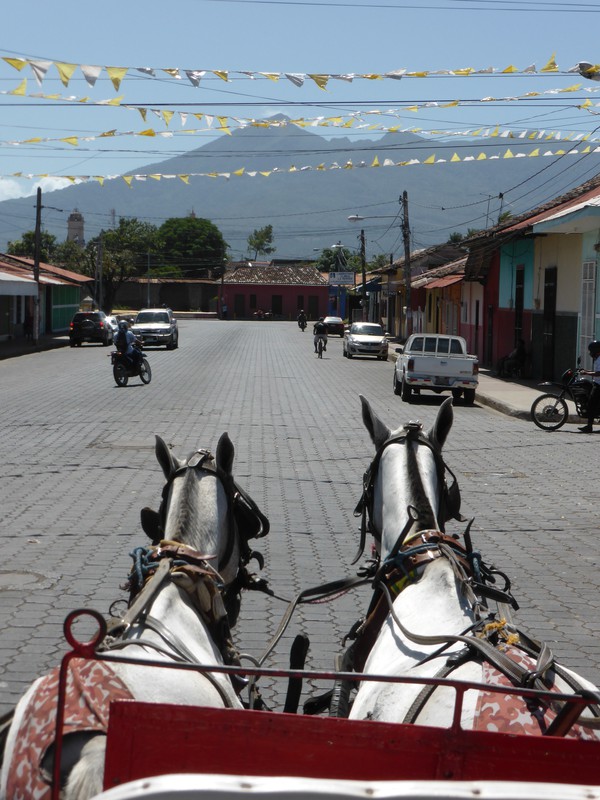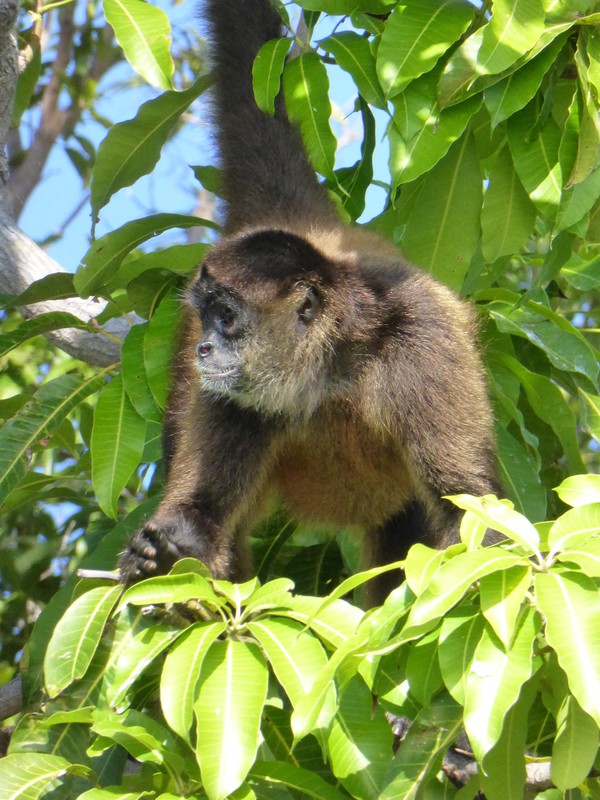
Granada, the most popular tourist attraction in Nicaragua, is a very strange place. On the surface it's a picture-perfect colonial town on the shores of Lago de Nicaragua, with cathedrals silhouetted against pure blue skies, horse-drawn carriages plying the streets, and plenty of restaurants and watering holes. As far as tourism is concerned, Granada ticks all the boxes.
It isn't all smiles, though. Sit down for a beer in one of the bars along the tourist enclave of Calle La Calzada and look around, and you'll see child labour, hard drinking, prostitution and thievery, all threading their nefarious ways through the oblivious American tourists. The 2003 travel book 1000 Places to See Before You Die says of Granada:
Lack of tourism has helped keep both Nicaragua's natural environment and its heritage intact. Nowhere is this more evident than in Granada.
I rather suspect that in today's Granada, the complete opposite is true, as a tide of tourism rolls into the city and encourages a side of Nicaragua that is considerably less appealing than the tourist board would have you believe.
Personality Disorder

Granada is physically attractive, there's no doubt about it. The Parque Central is utterly charming, and is the cleanest and crispest colonial plaza I've seen in the whole region; squint as the sun sets, and you could easily kid yourself that you're in Spain rather than the poorest country in Central America. As with most colonial towns, it's all about the churches and the plazas, and Granada has plenty of options, from the crumbling Iglesia de la Merced (whose tower you can climb for a classic view over the city) to the sparklingly clean white-and-earth tones of the cathedral's new paint job. You can't help clicking your camera every time you turn a corner, and there are lots of corners in this grid-based city.

It was hot when we visited, too hot for us to explore on foot, so we took an hour's ride in a horse-drawn carriage to see all the main sights. They are delightful. We then walked down to the lake shore and explored the rather downtrodden Centro Turistico park to the southeast of town, and yes, if you ignore the tired tourist park with its ugly restaurants and piles of litter, it is all very pretty. We also met up with Pamela and Matteo, whom we'd last seen in Suchitoto in El Salvador; they'd gone on to Honduras and the Bay Islands, but the weather had been terrible and they found Honduras to be scary and dangerous, so they'd come back to Nicaragua and got in touch when they reached Granada. We teamed up with them to go on an hour-long boat ride to Las Isletas, a collection of hundreds of beautiful islands to the south of town, where millionaires' houses perch on the rocks that were thrown from the nearby Volcán Mombacho that dominates the skyline to the south. Yes, physically, Granada does the job; it is an attractive place, no doubt about it.

But it's the personality of the city that's the problem. Yes, the buildings are lovely, but it's hard to warm to the locals here, and after a few days, we just found it wearing. Take a seat at one of the tables in the main tourist drag, and you'll be subjected to a constant stream of jaded men, women and children trying to sell you anything from hammocks to cigarettes; it's polite to say 'No, gracias', but it soon becomes a chore that neither party enjoy. Sit there for long enough, and a group of children will come along and perform La Gigantona, which involves extremely loud drumming; a 3m-tall costume of a women with a young man inside, twirling and jiggling up the street; a child in a squat costume with a large head who spins round and round; and after the drumming has stopped, a gaggle of disinterested children coming up and asking for money. The first time you see it, it's quite good fun; after it's gone past for the fiftieth time and totally disrupted your evening, it's harder to be charitable, especially as the children stay up late at night to perform this endless tourist cash-trap, and end up handing the money over to a Fagin-esque figure who, out of the glare of the main tourist trade, berates them for not dancing properly, and drives them on to keep dancing, way past any sensible bed time for a child. It's all a bit unsavoury.

Then there's the guy who will befriend you in the park by the lake, ask you where you're from and how long you've been here, before brazenly saying, 'Give me money,' in a tone of voice that says, without ambiguity, that you are nothing more to him than a walking wallet. Or the child who sits down at your table and asks you for money, telling you that he has no parents and sleeps rough in the square, despite clear evidence to the contrary in the shape of his perfectly washed and ironed clothes, clean hair and good shoes. Or the scarred and battered man who points to your friend's cigarette packet and says, 'Give me one,' and when you politely shake your head, he says, 'I am Honduran, give me a cigarette or I will cut you, I will see you and I will cut you, give me one now,' before the waiter idly standing a few feet away finally comes over and pushes him away. Or how about the guy in the backwards baseball cap who tries to steal your wallet by bumping into you and slipping his fingers into your trouser pocket; when he tried it on me, he discovered that I always close my pocket with two interlocked safety pins for just this eventuality – he wasn't pleased and spun round after bumping into me, brazenly giving me the evil eye and shouting at me, rather than just slipping into the crowd like a more intelligent thief would do.

Or how about the poor American boy we met in the bank, who that morning had arrived from the north of the country; on the bus into Managua he'd been befriended by a lovely old woman and her daughter-in-law, who had said that they were going on to Granada and were being picked up by her son and husband, so would he like a lift into town? And as soon as he got in the car, the old woman sat on his lap while her son pulled out a knife, held it to his throat, got him to reveal his pin number and hand over his cash and cards, and then cleaned out his bank account. The moral of the story? Trust absolutely nobody round here.

It isn't just about touts and thieves, though; it's the little things, which would normally be minor inconveniences, but which come thick and fast in this town. Like the park attendant who, seeing that we were sitting on a bench in an almost empty park, stopped on his bike, picked up a nearby sprinkler, and stuck it in the ground right in front of our bench, so we had to get up and move. Or the lady at our hotel, who seemed genetically unable to crack a smile, despite our very best efforts to be nice. Or the waitress at the coffee shop who, when we asked, said that yes, the iced coffee came with milk, which it then didn't, and when we pointed out that she'd said it came with milk, she just looked at us with forlorn stupidity and said, 'Oh, yes, sorry,' before saying that they didn't have any milk anyway, and still asking for a tip.

Or how about the American restaurant owner who asked us how our meal was, and when we said that it had been nice but the curry had been far too hot to eat, he sat there and noisily blamed his staff for being useless and not knowing how to cook, shrugging and saying, 'Well, this is Nicaragua.' Meanwhile, he just sat outside the restaurant, chatting with his friends and totally failing to do anything like, say, training his staff properly.

But the most unsavoury moment came as we sat in the tourist street, enjoying a beer with Pamela and Matteo while the Superbowl final erupted on televisions all along the road. A seriously drunk tourist, who could hardly stand up he was so battered, kept staggering after one of the street urchins, bending down to joke with him and putting his arm on his shoulder in a manner that instantly set alarm bells ringing in the paedo-paranoid psyches of us watching westerners. Nobody said anything until another of the local touts, who seemed to be unable to speak, saw what was happening and warned the drunkard off the little boy, using the power of sign language to make it clear that this was not OK. The mute tried to explain to the barmen that something dodgy was going on, but they seemed uninterested, and it was only his persistence that eventually put the drunkard off trying to make friends with the boy. I guess there are plenty more fish in the sea, when there are children on the streets and money in the sex tourist's pocket.
So Granada may once have been a place where Nicaragua's lack of tourism kept the natural environment and its heritage intact, but I'm not sure that's the case any more. For me, the beauty of Granada really is only skin deep.